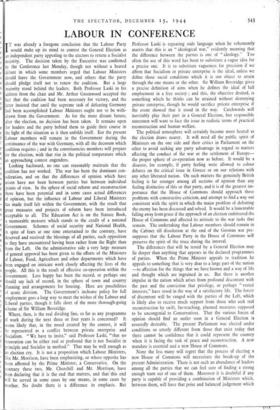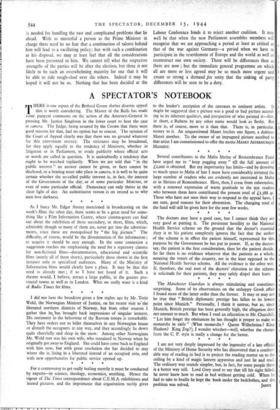LABOUR IN CONFERENCE
T was already a foregone conclusion that the Labour Party I would make up its mind to contest the General Election as an independent party appealing to the electors to return a Socialist majority. The decision taken by the Executive was confirmed by the Conference last Monday, though not without a heated debate in which some members urged that Labour Ministers should leave the Government now, and others that the party should pledge itself not to renew the coalition. But a large majority stood behind the leaders. Both Professor Laski in his address from the chair and Mr. Arthur Greenwood accepted the fact that the coalition had been necessary for victory, and the latter insisted that until the supreme task of defeating Germany had been accomplished Labour Ministers ought not to be with- drawn from the Government. As for the more distant future, after the election, no decision has been taken. It remains open for leaders and the party behind them to guide their course in the light of the situation as it then unfolds itself. or the present Labour members will remain in the Government during the continuance of the war with Germany, with all the decorum which coalition requires ; and in the constituencies members will prepare for the election, with that rise in the political temperature which an approaching contest engenders.
Looking backward, no one can reasonably maintain that the coalition has not worked. The war has been the dominant con- sideration, and on that the differences of opinion which have arisen have not been between parties but between individual points of view. In the sphere of social reform and reconstruction there have been potential and in some cases actual differences of opinion, but the influence of Labour and Liberal Ministers has made itself felt within the Government, with the result that great measures and projects of reform have been introduced acceptable to all. The Education Act is on the Statute Book, a memorable measure which stands to the credit of a national Government. Schemes of social security and National Health, in spite of fears at one time entertained to the contrary, have deserved and received the blessings of all parties, such opposition as they have encountered having been rather from the Right than from the Left. On the administrative side a very large measure of general approval has been given to the efforts of the Ministers of Labour, Food, Agriculture and other departments which have been engaged on intricate work closely affecting the lives of the people. All this is the result of effective co-operation within the Government. Less happy has been the record, or perhaps one should say lack of record, in the sphere of town and country planning and arrangements for housing. Here are possibilities of acute division. The Government's inchoate policy for full employment goes a long way to meet the wishes of the Labour and Liberal parties, though it falls short of the more thorough-going scheme of Sir William Beveridge.
Where, then, is the real dividing line, so far as any programme of work during the next three or four years is concerned? It seems likely that, in the mood created by the contest, it will be represented as a conflict between private enterprise and Socialism. "We have to insist," said Professor Laski, "that no renovation can be either real or profound that is not Socialist in principle and Socialist in method." That may be well enough as an election cry. It is not a proposition which Labour Ministers, like Mr. Morrison, have been emphasizing, or whose opposite has been affirmed by the Prime Minister, a Conservative. On the contrary these two, Mr. Churchill and Mr. Morrispn, have been declaring that it is the end that matters, and that this end Will be served in some cases by one means, in some cases by another. No doubt there is a difference in emphasis. But Professor Laski is repeating stale language when he vehemently asserts that this is an "ideological war," evidently meaning that the difference between the parties is one of "ideology." Too often the use of this word has been to substitute a vague idea for a precise one. It is to substitute vagueness for precision if we affirm that Socialism or private enterprise is the ideal, unless we define those social conditions which it is our object to attain through the one means or the other. Sir William Beveridge gives a precise definition of aims when he defines the ideal of full employment in a free society ; and this, the objective desired, is something which he thinks can be attained without destroying private enterprise, though he would sacrifice private enterprise if the event showed that it stood in the way. Catchwords will inevitably play their part in a General Election, but responsible statesmen will want to face the issue in realistic terms of practical reconstruction and human welfare.
The political atmosphere will certainly become more heated as the election draws nearer. It will need all the public spirit of Ministers on the one side and their critics in Parliament on the other to avoid seeking any party advantage in regard to matters affecting the conduct of the war or the settlement of Europe— the proper sphere of co-operation now as before. It would be a disaster, for example, if party feeling were allowed to colour debates on the critical issue in Greece or on our relations with any other liberated nation. On such matters the genuinely British feeling is far stronger among all sections of opinion than any feeling distinctive of this or that party, and it is of the greatest im- portance that the House of Commons should approach these problems with constructive criticism, and attempt to find a way out consistent with the spirit in which the major problem of defeating the enemy has been discussed and solved. It would be a lamentable falling away from grace if the approach of an election embittered the House of Commons and affected its attitude to the war tasks that remain. The undertaking that Labour members should remain in the Cabinet till dissolution at the end of the German war pre- supposes that the Labour Party in the House of Commons will preserve the spirit of the truce during the interval.
The differences that will be tested by a General Election may lie deeper than anything that appears in the declared programmes of parties. When the Prime Minister appeals to tradition he appeals to something that is very dear to a large part of the nation —to affection for the things that we have known and a way of life and thought which are ingrained in us. But there is another impulse in the nation which arises from profound discontent with the past and the conviction that privilege, or perhaps "vested interests," have stood in the way of a satisfactory life. The forces of discontent will be ranged with the parties of the Left, which is likely also to receive much support from those who seek real reconstruction by swift, far-reaching, planned measures supposed to be uncongenial to Conservatives. That the various forces of opinion should find an outlet soon in a General Election is assuredly desirable. The present Parliament was elected under conditions so utterly different from those that exist today that there cannot be confidence that it could represent the country when it is facing the task of peace and reconstruction. A new mandate is essential and a new House of Commons.
None the less many will regret that the process of electing a new House of Commons will necessitate the break-up of the present Administration. There is not such an abundance of leaders among all the parties that we can feel sure of finding a strong enough team out of one of them. Moreover it is doubtful if any party is capable of providing a combination of Ministers which, between them, will have that poise and balanced judgement which is needed for handling the vast and complicated problems that lie ahead. With so masterful a person as the Prime Minister in charge there need be no fear that a combination of talents behind him will lead to a vacillating policy ; but with such a combination at his disposal, we may at least feel that all the considerations have been presented to him. We cannot tell what the respective strengths of the parties will be after the election, but there is not likely to be such an overwhelming majority for one that it will be able to ride rough-shod over the others. Indeed it may be hoped it will not be so. Nothing that has been decided at the Labour Conference binds it to reject another coalition. It may well be that when the new Parliament assembles members will recognise that we are approaching a period at least as critical as that of the war against Germany—a ptriod when we have to participate in the resettlement of Europe and the world as well as reconstruct our own society. There will be differences then as there are now ; but the immediate general programme on which all are more or less agreed may be so much more urgent and create so strong a demand for unity that the sinking of party differences will be seen to be a duty.



























 Previous page
Previous page